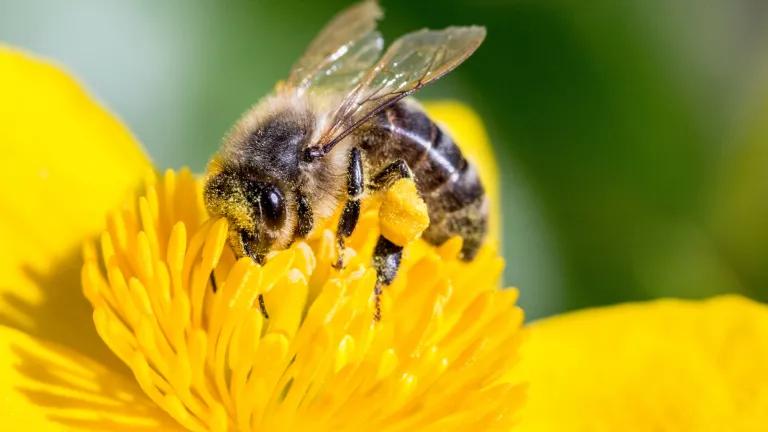This Farm Bill Can Make or Break Organic Farmers
Update (December 20, 2018): On the balance, the final Farm Bill increases support for organic agriculture. The bill bumps up funding for organic research that will contribute to increased productivity, efficiency, and profits for organic farms. It also continues critical funding for the organic certification cost-share program, which keeps organic food more affordable and makes the required third-party organic certification more accessible, particularly for small farmers. In addition, the final bill retained a provision from the Senate bill that directs an assessment of public seed and breed research - a step toward increasing support for public breeding programs that are critical to the ongoing resilience of our food system.
Update (October 19, 2018): Congress allowed the Farm Bill to expire at the end of September, and now the race is on to reconcile the Senate’s strong bipartisan bill with the dangerous bill that made it through the House. NRDC continues to stand firmly against the damaging anti-environment riders in the House bill and you can too. There’s an easy path forward: Congress should pass the serious, bipartisan Senate legislation that was overwhelming adopted by Republicans and Democrats alike (86-11). This product of good faith negotiations would be the quickest, easiest way to deliver agricultural policy to those who depend on it. However, if we don’t see resolution by the end of the year, it’s critical that Congress ensure interim funding for important organic programs, like Organic Certification Cost Share and the Organic Research and Extension Initiative.
Update (June 13, 2018): After several weeks of strong advocacy, the Senate Agriculture Committee proposed a bipartisan Farm Bill that leaves most organic programs intact, but includes one revision to the law governing the National Organic Standards Board. The proposed bill also includes promising soil health provisions. The bill heads to the full Senate next.
Update (May 22, 2018): The House of Representatives has rejected the House Agriculture Committee's first attempt at a Farm Bill. The Senate Agriculture Committee's proposal remains forthcoming and may include substantial threats to organic funding and integrity.
Original Post (May 7, 2018): The federal Farm Bill has a powerful impact on the cost of farming—both organic and non-organic. A version of the bill introduced by the House Agriculture Committee would cut existing programs for organic farmers and increase their costs, while at the same time continuing to use taxpayer dollars to artificially lower the costs of non-organic food.
Organic farmers shoulder expenses that their conventional counterparts push onto the public, like the costs of keeping air and waterways clean and protecting wildlife. Organic farmers also pay certifiers to verify their compliance with the strict National Organic Program rules.
At the same time, non-organic farmers benefit from many years of public investment in commodity crop subsidies, insurance, technical assistance, breeding, and research. This helps keep conventional food cheaper, leaving organic farmers to play catch up and the public to bear the burden of harms resulting from non-organic agriculture.
Recent Farm Bills have funded critical programs that help organic farmers cover some of their disproportionate costs, while protecting the environment and our health. This year, not only are those programs at risk, but Republicans are actively targeting the stakeholder processes that ensure organic standards stay strong. To top it off, the pending version of the bill continues to disproportionately favor conventional production.
Existing Farm Bill programs at risk include:
- The National Organic Certification Cost Share Program reimburses a portion of inspection and certification fees annually, making organic certification more accessible for small and transitioning organic farms. The pending version of the Farm Bill would cut funding for this program and the related Agricultural Management Assistance program.
- The Conservation Stewardship Program pays farmers to reduce erosion, protect drinking water, and preserve wildlife habitat. This program is on the chopping block.
The U.S.’s organic rules were built to evolve with public input; this Farm Bill threatens that process.
The House’s bill also targets the foundation of the U.S.’s organic industry, sending a clear signal that health and transparency are not top priorities.
The Organic Foods Production Act (enacted as part of the 1990 Farm Bill) set the framework for our organic rules, and it established a diverse stakeholder group—the National Organic Standards Board (NOSB)—to oversee the rules on an ongoing basis. The 15-member NOSB represents a wide range of interests in the organic food chain: it includes organic farmers, processors, and a retailer, environmentalists, consumers, a scientist, and an organic certifier.
In order to protect the integrity of organic foods, the NOSB reviews and advises on materials allowed under the organic rules. In general, synthetic pesticides and fertilizers are prohibited and natural farming inputs are allowed, with a few exceptions. Certain nonorganic materials may also be used in organic handling and processing. The NOSB weighs in on every potential change to the lists of allowed and prohibited materials and revisits each material every five years. Changes require thorough evaluation of ecological and health impacts, availability of alternatives, and “compatibility with a system of sustainable agriculture.”
The public normally has a strong voice in this process, but policies proposed for this Farm Bill could cut the public out. A provision allowing expedited review of certain materials could allow more substances to slip onto the “allowed” list. And a provision that gives other federal agencies a stronger hand in the review process may interfere with public participation and steer the NOSB away from holistic materials review.
The Senate Agriculture Committee’s version of the Farm Bill, in progress right now, may pose even greater threats to organic integrity.
Our Farm Bill should nourish us by stepping up investment in resilient farming, curbing pesticide use, and increasing access to organic food. While the House bill preserves some existing organic programs, its attacks on organic are on the long list of poison pills that will prevent it from moving forward. The Senate must do better to protect our nation’s organic farmers, and consumers’ access to safe, healthy food.




